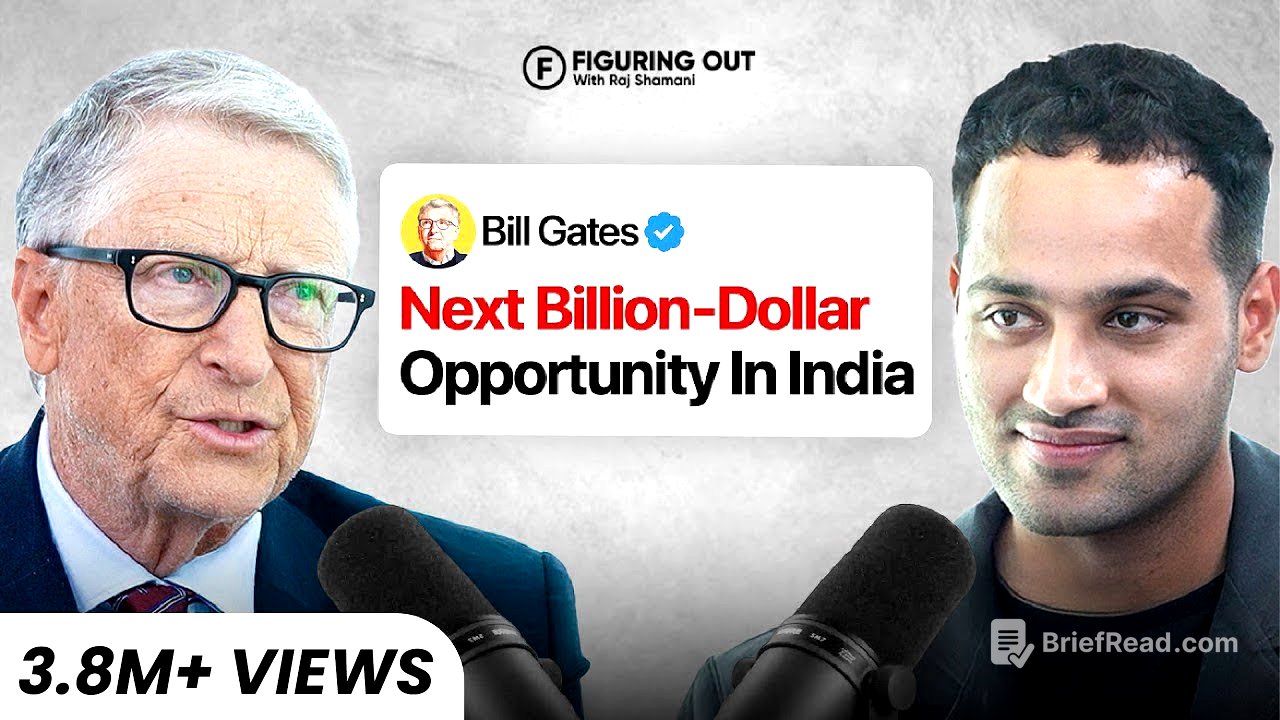TLDR;
Raj Shamani interviews Bill Gates, discussing India's innovation, philanthropy, AI, and Gates' personal perspectives. Gates shares insights on India's talent, his philanthropic approach, AI's potential, and his fears about cognitive decline. He emphasizes continuous learning and adapting to new technologies.
- India's growing innovation and talent pool.
- Philanthropic views on wealth distribution.
- AI's transformative potential and associated risks.
- The importance of continuous learning and adaptability.
- Personal fears about cognitive decline and the value of wisdom.
Introduction [0:00]
Raj Shamani expresses gratitude for the opportunity to interview Bill Gates, a figure he admired since childhood. He reflects on the surreal experience of sitting down with Gates, transitioning from initial nervousness to engaging in a conversation about Gates' fears, misunderstandings, and mission. Shamani encourages viewers to watch the episode through the lens of a 20-year-old seeking to understand Gates' thought processes.
Raj Shamani x Bill Gates begins [3:16]
Raj Shamani recounts a personal anecdote about predicting he would interview Bill Gates, highlighting the unexpected realization of this goal. He expresses his gratitude to Gates for participating in the interview.
Observations on India [3:52]
Bill Gates shares his observations on India, noting the significant changes and the explosion of entrepreneurship and innovation. He mentions the Gates Foundation's initial focus on health challenges in India, which has broadened to include inventions in vaccines, seeds, diagnostics, and AI applications for health and education. Gates emphasizes the positive impact of India's innovation ecosystem on both India and the world. He also mentions Microsoft's history of hiring Indian talent and establishing Microsoft India.
India: The Global Talent Capital [6:40]
Raj Shamani inquires about India's emergence as a global talent capital. Gates attributes this to India's large population, emphasis on engineering and software education, and the combination of engineering and management skills found in leaders like Sundar Pichai and Satya Nadella. He also acknowledges the role of great universities, including the IITs, in cultivating this talent.
Views on Inheritance [8:00]
Raj Shamani discusses the common belief in India that parents should save their wealth for their children's inheritance. Bill Gates shares his philosophy of giving his children a great upbringing and education but leaving them less than 1% of his wealth. He explains that he wants his children to have their own earnings and success, not be overshadowed by his fortune. Gates notes that the tech sector is generally more aggressive about philanthropy, with individuals giving away a larger portion of their capital compared to other industries. He also mentions explaining his philanthropic philosophy early on to his children, emphasizing that the highest calling for his resources is to help the neediest through the foundation.
People He’d Like to Meet Again [11:34]
Raj Shamani asks Bill Gates which three Indians, dead or alive, he would invite for dinner. Gates mentions his interactions with the Prime Minister, scientist Raj Bond, mathematician Ramanujan, and Ratan Tata, as well as various philanthropists and innovators. He also acknowledges the difficulty of choosing only three due to the abundance of incredible talent in India.
Future Possibilities [13:33]
Raj Shamani asks Bill Gates where he would invest his time if he were to start a company from scratch in India today. Gates says he would focus on something he enjoys and has a world-class understanding of, such as AI. He acknowledges the significant opportunities in AI, despite the competition from large companies, and suggests that AI is today's equivalent of software when he was young.
What People Misunderstand About Him [16:18]
Raj Shamani asks Bill Gates about the biggest misunderstanding people have about him. Gates responds that people often assume those with significant power or wealth have different values and hidden agendas. He hopes that those who know him understand his love for the foundation work and his relationships with friends and family, which differ from the perception of him as someone pushing levers with too much money and authority.
Mistakes Made by Bill Gates [17:50]
Raj Shamani asks Bill Gates if he has made any major mistakes. Gates admits to several public failures, including Microsoft's unsuccessful phone operating system, which allowed Android to dominate. He also mentions challenges with the Gates Foundation, such as the lack of an HIV vaccine, the high cost of a cheap toilet, and the prolonged effort to eradicate polio.
Advice for Young People [20:30]
Raj Shamani asks Bill Gates what young people should do to convince more people to help others. Gates advises young people in India to travel a short distance to see those who lack the same opportunities, highlighting the importance of empathy. He also praises India's aspirational district program and open discussion of issues like sanitation.
Problems That Money Cannot Fix [21:42]
Raj Shamani asks Bill Gates what problem he feels money cannot fix. Gates points to behavior change, particularly regarding obesity. He mentions the Prime Minister's promotion of yoga and the difficulty of achieving widespread behavior change. Gates suggests that a combination of behavior change and scientific solutions, such as affordable glp1 drugs, may be the most promising approach.
Behaviors Everyone Should Adopt [23:01]
Raj Shamani asks Bill Gates what behavior everyone should adopt. Gates emphasizes the importance of being a continuous learner, constantly seeking to understand new things and being self-critical. He highlights the value of reading, being a student, and having people who can teach him.
Perspectives on India [24:32]
Raj Shamani notes that the entire Gates Foundation board is visiting India and asks about Gates' priorities for the nation. Gates mentions the need to reduce the child mortality rate, address malnutrition, and leverage advancements in biology to improve health outcomes. He expresses his commitment to working with scientists and institutions in India to achieve these goals.
Accuracy of Predictions [26:13]
Raj Shamani asks Bill Gates how he spots trends and makes accurate predictions. Gates attributes his insights to his early familiarity with digital technology and his involvement in the global health community. He explains that his warnings about the risk of a pandemic were based on commonplace knowledge within the global health community, but he was in a position to be listened to.
Things He Fears [28:44]
Raj Shamani asks Bill Gates if he fears anything today. Gates expresses concern about shaping AI in a positive way, avoiding the next pandemic and nuclear war, preventing bioterrorism, and mitigating climate change. He emphasizes the need to minimize the chances of these threats and use additional wealth and insights to address them.
Personal Fears [29:37]
Raj Shamani asks Bill Gates about his personal fears. Gates says he doesn't fear heights, planes, or fire, but he worries about his brain becoming less capable as he ages. He acknowledges that cognitive decline is disappointing because he enjoys learning and contributing to society.
Being a Maniac in His 20s [31:44]
Raj Shamani asks Bill Gates if he feels any changes between the Bill Gates of 25 and the Bill Gates of 70. Gates reflects on his intense focus on software development in his 20s, sacrificing time off and maintaining a relentless work ethic. He acknowledges that his management skills were lacking at the time but emphasizes his stamina and focus as key to his success.
What He Is Currently Learning [33:54]
Raj Shamani asks Bill Gates what he is currently learning. Gates mentions staying on top of AI developments, exploring AI applications for mental health care, and understanding how AI companions can help people. He references Reed Hoffman's book "Superagency" and his efforts to meet people pushing the boundaries of AI.
What Young People Should Start Learning [35:13]
Raj Shamani asks Bill Gates what young people should start learning today. Gates advises that not everyone needs to learn the underlying mathematics of AI, but everyone should be a user of AI. He suggests using AI to enhance creative work and learning, emphasizing the abundance of educational material available online.
India’s Contribution to the Gates Foundation’s Strategies [37:20]
Raj Shamani asks how India is contributing to the Gates Foundation's global strategies. Gates explains that more and more innovation is being done in India due to its depth of talent and desire for frugal solutions. He notes that while basic science insights may still come from institutions in the rich world, India is excelling in putting the pieces together, including AI for healthcare.
What People Should Think When They Hear “Bill Gates” [39:19]
Raj Shamani asks Bill Gates what he wants people to think when they hear his name. Gates hopes people will recognize his efforts in championing resources to end diseases like polio and malaria, envisioning a future where these diseases are no longer a concern.
Problems That Will Be Solved in the Next 5 Years [40:32]
Raj Shamani asks which problem Bill Gates thinks will be solved in the next five years. Gates expects polio to be eradicated within five years, which will provide credibility to tackle other diseases like malaria and measles.
Thanks for Listening [41:29]
Raj Shamani expresses his gratitude to Bill Gates for the interview, reflecting on the surreal experience of interviewing someone he admired since childhood.
Behind the Scenes [42:20]
A brief glimpse behind the scenes of the interview setup.
Outro [42:56]
Raj Shamani thanks viewers for watching and encourages them to suggest future guests for the show.









